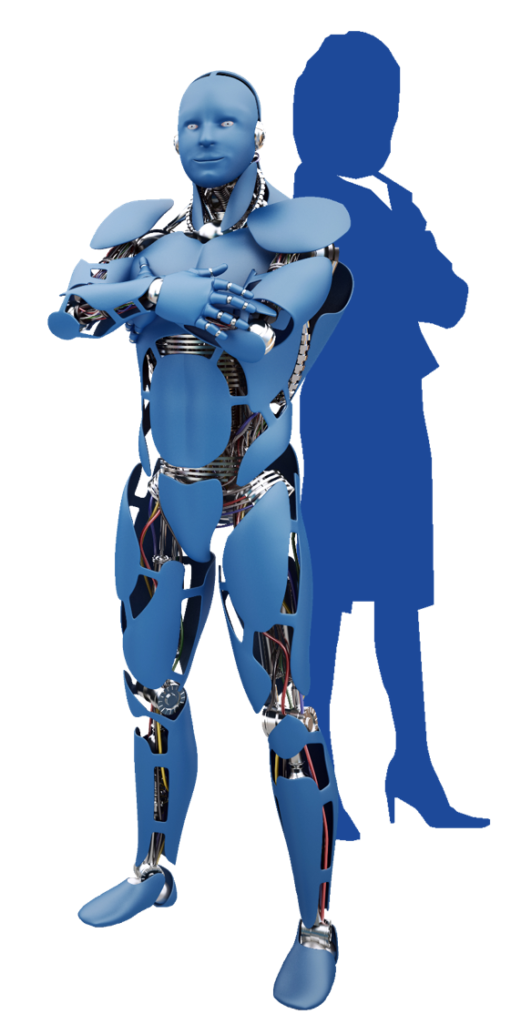“Should we be afraid,” asks Molly Connell. “Many experts fear that robots will take over most jobs within the next 30 years, which would send unemployment rates through the roof.”[1] The media is rife with predictions about the end of human labor as artificial intelligence and robotics begin taking over more and more jobs. Connell asserts such fears may not be justified. For example, she notes that even though the United States is currently the fourth biggest market for robots unemployment is decreasing. Rebecca Greenfield (@rzgreenfield) adds, “Automation may be gutting American manufacturing jobs, but there’s one thing the robots still can’t beat us at: people skills.”[2] Will artificial intelligence and robotics relentlessly take over jobs in the years ahead. Probably. Does this mean there is no future for the human worker? Probably not.
Humans versus Machines
Analysts from IEDP note, “Historical evidence and economic theory suggest that advances in technology do not cause structural unemployment, and that productivity gains and demand for new products create enough new jobs to offset those lost. Today however, technology may be advancing so rapidly that much of the workforce can’t be retrained with new skills fast enough, according to Michigan Ross professor Mohamed Mostagir. What has changed is the speed at which new skills become outdated.”[3] Although many media reports paint the current situation as humans versus machines, IEDP analysts assert it would be more accurate to view the current situation as humans versus themselves. They explain, “Manpower’s 2015 survey found that 38% of employers worldwide had difficulty filling jobs, a 2-point increase from the previous year.” In other words, the jobs are there if humans can retrain and reskill themselves to fill them. If the skills gap is not addressed, IEDP analysts believe the “humans versus machines” paradigm will emerge. “Machines are getting better and smarter,” they write, “so if machines are not going to replace more and more human jobs we need to act now.”
In some areas — like manufacturing — the battle for jobs has already been lost. Greenfield reports, “Automation accounts for the bulk of manufacturing job loss in the U.S. — 88 percent of it from 2000 to 2010, the decade with the sharpest drop in these jobs, Ball State University researchers found. And many, many people have argued that even if Donald Trump manages to keep some factory jobs in the U.S., he can’t reverse the automation trends that have already decimated jobs.” Whenever a humans-versus-machines scenario emerges, machines are likely to win. Greenfield suggests we need to change battlefields to ones where human skills matter most. She explains, “The occupations projected to add the most jobs in the next 10 years, according to the Bureau of Labor Statistics, all require people skills — like home health aides, registered nurses, and retail and service workers.” She continues:
“The future of American labor lies in jobs that require empathy and critical thinking. For an office worker, that could mean being able to communicate across departments. For someone in customer service, it’s interacting with another complicated human. For a care provider, it’s the empathy to help someone vulnerable and in need. These are all skills robots are really bad at — at least for now. And they have, over the last three decades, become increasingly vital in the labor market. Between 1980 and 2012, the share of the labor force occupied by jobs requiring ‘high social skills’ grew by almost 10 percentage points, according to a National Bureau of Economic Relations paper last year called ‘The Growing Importance of Social Skills in the Labor Market.’ That’s true even in fields not typically thought to require social skills. Tech and finance companies are increasingly putting a premium on people with social skills for jobs in areas like product management, marketing, and business strategy. And even as demand and wages have risen overall for science, technology, engineering, and math (STEM) jobs, wages have risen the most for those STEM workers with high social skills, the NBER study found. Indeed, employers report that social skills are just as important as technical skills, and harder to hire for.”
Unfortunately, jobs requiring social skills often don’t pay as well as jobs requiring technical skills. That’s one of the challenges society is going to have to deal with in the years ahead. Even in areas requiring high social skills, technology is going to affect how people work. That’s why I believe the future workplace is one in which humans and machines collaborate.
Humans + Machines
I’m not alone in my belief that a collaborative future between humans and machines is the most likely one to emerge. Rob Enderle (@Enderle), President and principal analyst of the Enderle Group, writes, “In the near future, artificial intelligence agents will focus on all areas of business. But fear not, AI agents will not be replacing people, but making them better and far more effective.”[4] He explains:
“Ultimately, AI agents can and will be focused on all areas of business. From better qualifying sales leads and providing a framework for a sales approach uniquely designed for the prospect, to looking across a company to identify obvious waste, point out for corrective action stupid decisions, and flag unusual behavior that could be associated with either an internal or external security breach in progress. The implication, however, isn’t the replacement of employees (except for jobs that are highly repetitive and aren’t optimized for people anyway). The use of AI agents simply makes existing employees far more effective, more capable and far less likely to make mistakes. It is a blending of human and machine into something more, something that optimizes what people are good at, applying creativity to a problem, and ties it to what systems are good at (scanning massive amounts of data quickly and forming related recommendations) to create something more than either could ever do individually.”
Roland Moore-Colyer (@roland_mc) reports Forrester analysts share my optimism about a collaborative human/machine future.[5] “Humans will work alongside robots rather than lose their jobs to automated machines, according to a new report from analyst firm Forrester,” he writes, “although millions of traditional jobs will die out as this change occurs.” I agree that the job landscape is going to feel the effects of tectonic shifts generated by automation. John Lovelock, a research vice president and chief forecaster at Gartner, foresees a future in which “the relationships between people and machines will continue to become increasingly collaborative.”[6] His sees automation enhancing rather than replacing many jobs. He explains:
“The relationships between machines and people are becoming increasingly collaborative as smart machines acquire the capabilities to perform more and more daily tasks and increase their capacity to perform routine activities currently done by people. As this evolution continues, we will see the new wave of task displacement and realigning of skills in the workplace. ‘Smartness’ is now everywhere in the work environment and in a continued pursuit of efficiency, routine tasks consisting of non-value added activities and repetitive tasks are ripe for replacement by some form of automation.”
Shawn DuBravac (@shawndubravac), Chief Economist of the Consumer Technology Association, agrees with Lovelock that AI should make people better at their jobs. “Rather than thinking about these AI computer systems taking over our jobs,” he writes, “we should think about AI taking over specific tasks, augmenting our jobs and forever changing how we work.”[6]
Summary
I remain optimistic that human workers have a future; but, they better prepare themselves for work in which collaboration with machines is the norm. Many (if not most) of our jobs already involve some kind of interaction with machines. Tomorrow’s machines will simply be smarter and we need to become smarter about how to collaborate with them. Royal Frasier (@royalfrasier), a marketing and PR strategist at Gryphon Agency, concludes, “The nature of work will change dramatically with AI. We’ll have technology that augments our skills and abilities. … We’ll work alongside robotic colleagues that help us with our most challenging tasks. In terms of cognitive computing, we’re talking about amplifying human cognition, not replacing the human mind. There is so much to be gained when we uncover ideas and solutions we wouldn’t have been able to do on our own.”[7]
Footnotes
[1] Molly Connell, “Should we be afraid?” IndustryWeek, 13 December 2016.
[2] Rebecca Greenfield, “Forget Robots—People Skills Are the Future of American Jobs,” Information Management, 12 December 2016.
[3] Staff, “Humans Vs Machines – Mind the Skills Gap,” IEDP, 15 December 2016.
[4] Rob Enderle, “The future of AI is humans + machines,” CIO, 9 December 2016.
[5] Roland Moore-Colyer, “Robots and humans will work together as job roles evolve,” V3.co.uk, 25 August 2015.
[6] Shawn DuBravac, “Robots Are Coming,” U.S. News & World Report, 12 November 2015.
[7] Royal Frasier, “Artificial Intelligence: It’s Not Man vs. Machine. It’s Man And Machine,” Gigaom, 5 October 2016.





